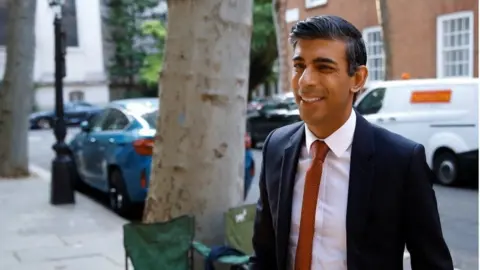Rishi Sunak: I flew home to stop Christmas Covid lockdown
 Reuters
ReutersTory leadership candidate Rishi Sunak has said that in December 2021 he flew back from an overseas government trip to stop a Covid lockdown which was "hours" away from being announced.
The ex-chancellor told LBC a lockdown would have damaged businesses and he successfully fought hard to stop one.
At the time, the Omicron variant was spreading rapidly and new restrictions had been introduced.
Ministers had said they couldn't rule out a Christmas lockdown.
Speaking to LBC radio's Andrew Marr, Mr Sunak said he had feared the country was "sleepwalking into another national lockdown" and that a press conference had been scheduled to announce new restrictions.
Mr Sunak argued this proved he was "prepared to push hard and fight for the things I believe in, even when that is difficult".
On 8 December 2021, the government implemented its 'plan B' measures which included making face masks compulsory in most public places and asking people to work from home.
Rising Omicron cases had led to fears that Christmas get-togethers would be cancelled, as they had been the previous year.
On 16 December, it was reported that Mr Sunak cut short a trip in the US for talks with businesses concerned about the impact of the Omicron variant.
The BBC was told that civil servants had produced three options for future Covid measures - ranging in severity. In the event, no lockdown was announced in England meaning families could see each other over Christmas. Scotland, Wales and Northern Ireland introduced tighter rules.

Analysis by political correspondent David Wallace Lockhart
Rishi Sunak outlined quite a dramatic sequence of events - flying back to the UK to prevent a lockdown in England with just hours to spare.
What he didn't mention was that he was on the receiving end of quite a bit of criticism at that point for being in California when the Omicron variant was surging.
But he did come back from overseas early, and tonight he stressed that he fought "very hard" to stop this potential lockdown.
A number of government sources have told me that he was far from a lone voice around the cabinet table when it came to opposing this step.
But, with the economy as the focus of the debate to be the next prime minister, Mr Sunak is keen to stress that he backed keeping businesses open. The alternative may well have been further taxpayer support.

During the interview, Mr Sunak also said he was best placed to defeat Labour arguing that "all the evidence we have today" showed his opponent Liz Truss would not win the next general election.
He also said her tax plans would lead to higher inflation and that most people appreciated that money borrowed during the pandemic had to be paid back.
Mr Sunak has previously promised to cut personal taxes once inflation is more manageable.
He said his life "would be easier" if he could promise to do "lovely things" but added "that wouldn't be leadership and it would damage trust".
"Promising a bunch of things I don't think are right or deliverable would be wrong."
Mr Sunak said it was important to restore "trust" and promised he would appoint a new independent ethics adviser as one of his first acts as prime minister.
The post is currently empty, after Lord Geidt resigned accusing Boris Johnson of putting him in an "impossible and odious" position.
Asked if he would bring back Lord Geidt, Mr Sunak said he "probably" would because he thought he did a good job.
Foreign Secretary Ms Truss has defended her plans as "affordable" and said putting up taxes was "choking off growth".
Speaking to the BBC's Today programme, she said: "We have had a consensus of the Treasury, of economists, with the Financial Times, with other outlets, peddling a particular type of economic policy for 20 years. It hasn't delivered growth."
Later in the day she told reporters she was Labour's worst nightmare and would "challenge their orthodoxy".
Tax has become the key battleground between the two candidates who are vying for votes from the roughly 160,000 Conservative Party members who will pick the next leader, and prime minister.
A YouGov poll has suggested Ms Truss is currently leading Mr Sunak by 24 points among Conservative voters.
Ballot papers will be sent out to members at the beginning of August and the winner will be announced on 5 September.
Hustings are due to take place throughout July and August, with the two candidates participating in a BBC TV debate on Monday.
The winner of the contest will take over from Boris Johnson, who was forced to announce his own resignation earlier this month.
